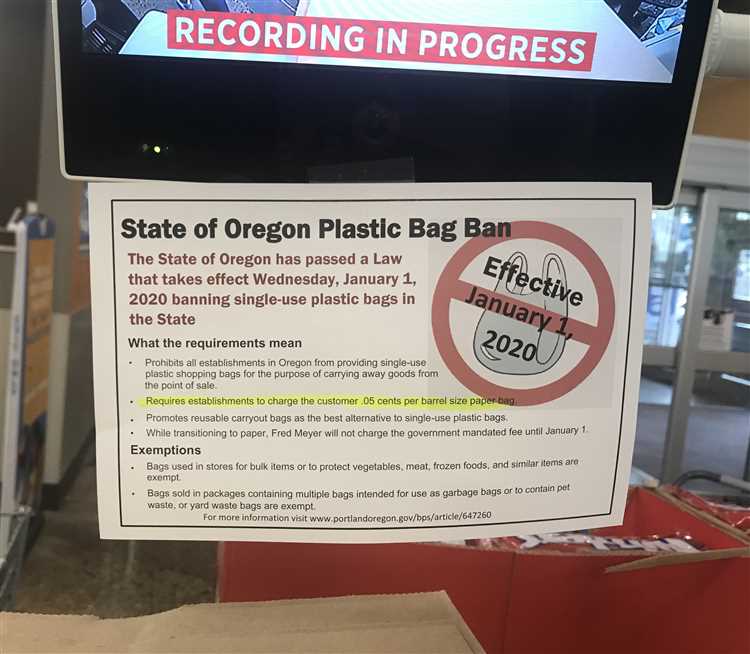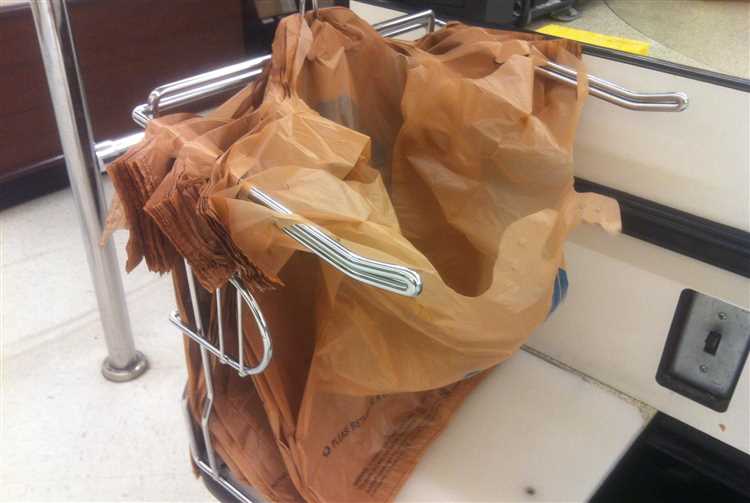In 2023, the state of Oregon will be implementing a bag fee in an effort to reduce plastic waste and encourage the use of reusable bags. This new legislation, which will go into effect on January 1, 2023, aims to build on the success of similar policies in other states and countries.
Under the new law, retailers in Oregon will be required to charge customers a fee for each single-use plastic bag provided at checkout. The fee is intended to discourage the use of these bags and promote more sustainable alternatives. This fee will not apply to certain types of bags, such as those used for bulk items, meats, or prescription medications.
The bag fee will be $0.05 per bag, and it will be up to individual retailers to determine how they will collect and remit the fees. The collected fees will be used to support environmental initiatives, such as litter clean-up programs and education campaigns about the importance of reducing plastic waste.
It is important for Oregon residents and visitors to be aware of this upcoming change and to start incorporating reusable bags into their shopping routines. By bringing their own bags, individuals can not only save money but also contribute to the preservation of the environment for future generations.
- What is the Bag Fee in Oregon
- Why was the Bag Fee Implemented
- How much is the Bag Fee
- Exemptions and Exceptions
- Where does the money from the Bag Fee go?
- Where does the Money from the Bag Fee go
- Environmental Initiatives and Programs
- Local Businesses Assistance
- Exemptions from the Bag Fee
- Who is exempt from the Bag Fee
- Question-answer:
- What is the bag fee in Oregon 2023?
- Why is there a bag fee in Oregon?
- How will the bag fee be implemented?
- Are there any exemptions from the bag fee?
- What will happen to the money collected from the bag fee?
What is the Bag Fee in Oregon
The Bag Fee in Oregon is a law that requires retailers to charge customers a fee for each single-use plastic bag or paper bag provided at the checkout counter. The purpose of the bag fee is to encourage the use of reusable bags and reduce the consumption of single-use bags, which contribute to environmental pollution and waste.
Starting from 2023, the bag fee will be implemented statewide in Oregon. The fee will apply to all retail establishments, including grocery stores, convenience stores, and pharmacies. The amount of the fee will be determined by the retailer, but there will be a minimum fee set by the state.
The bag fee does not apply to certain bags, such as bags used to package bulk items, bags used for prescription medications, and bags used for wrapping perishable items like meat and fish. Additionally, customers who participate in a federal food assistance program will be exempt from the bag fee.
The revenue generated from the bag fee will be used to support environmental programs and initiatives in Oregon. This includes funding for recycling, waste management, and education campaigns to raise awareness about the importance of reducing plastic waste.
By implementing the bag fee, Oregon aims to achieve its environmental goals and become a leader in sustainability. The bag fee is part of a larger effort to reduce plastic pollution and move towards a more environmentally friendly future.
Now that you know what the Bag Fee in Oregon is, make sure to bring your reusable bags when you shop to avoid the additional cost and help protect our environment!
Why was the Bag Fee Implemented
The bag fee in Oregon was implemented as a means to reduce the consumption of single-use bags and promote environmentally-friendly practices. Single-use plastic bags contribute to pollution and harm natural habitats for wildlife. They also take hundreds of years to decompose, adding to landfill waste. By imposing a bag fee, the state aims to encourage consumers to bring their own reusable bags when shopping, ultimately reducing the demand for plastic bags and decreasing their negative impact on the environment.
How much is the Bag Fee
The Bag Fee in Oregon, which goes into effect on January 1, 2023, will be $0.05 per bag. This fee will apply to both paper and plastic bags at all retail establishments statewide, including grocery stores, convenience stores, and other retailers.
It is important to note that the Bag Fee is not a tax, but rather a fee that is intended to encourage consumers to bring their own reusable bags when shopping. By implementing this fee, Oregon aims to reduce the use of single-use bags and promote sustainability.
Exemptions and Exceptions

There are certain exemptions and exceptions to the Bag Fee in Oregon. For example, bags used to package bulk items such as fruits, vegetables, nuts, grains, or candy are exempt from the fee. Additionally, bags used for takeout food or bags provided at restaurants for holding leftovers are also exempt.
Furthermore, individuals who participate in the Supplemental Nutrition Assistance Program (SNAP) or Women, Infants, and Children (WIC) programs are exempt from paying the Bag Fee. This exemption aims to ensure that low-income individuals and families have access to bags without incurring additional costs.
Where does the money from the Bag Fee go?
The revenue generated from the Bag Fee in Oregon will be retained by the retailers. However, retailers are encouraged to use a portion of the revenue to cover the cost of implementing the Bag Fee and to fund efforts to reduce the use of single-use bags.
It is also worth noting that the Bag Fee is just one component of Oregon’s larger strategy to minimize waste and promote recycling. The state has implemented various recycling programs and initiatives to help achieve its sustainability goals.
Where does the Money from the Bag Fee go

Starting from 2023, Oregon will implement a bag fee on single-use checkout bags. But where does the money collected from this bag fee go? Let’s explore:
Environmental Initiatives and Programs
A significant portion of the bag fee revenue will be dedicated to funding various environmental initiatives and programs. These initiatives may include:
- Cleaning up rivers, lakes, and other natural water sources
- Supporting recycling and waste management efforts
- Promoting sustainable practices and education regarding plastic pollution
- Restoring and preserving wildlife habitats
By allocating funds towards these initiatives, the bag fee aims to mitigate the environmental impact caused by single-use plastic bags.
Local Businesses Assistance
An important portion of the bag fee revenue is allocated to providing assistance to local businesses. This assistance can take different forms, including:
- Offering grants to help businesses transition to more sustainable packaging options
- Providing financial support for small businesses affected by the bag fee implementation
- Investing in programs that promote reusable bag usage
This allocation ensures that businesses are supported during the transition period and have access to resources to comply with the new regulations.
The bag fee revenue is planned to be allocated in a transparent and accountable manner. Detailed reports will be regularly published to inform the public about how the money is being used and the progress of the funded initiatives. Through this approach, Oregon aims to create a more sustainable and environmentally conscious future.
Disclaimer: The exact allocation of funds may vary and will be determined by the relevant authorities responsible for implementing the bag fee.
Exemptions from the Bag Fee
While the implementation of the Bag Fee in Oregon aims to reduce single-use plastic bag consumption, there are certain exemptions to this fee that have been put in place. These exemptions ensure that certain individuals and businesses are not burdened with the additional cost.
1. Restaurants and Prepared Food Providers: Retail establishments that primarily sell prepared food to be consumed on the premises, such as restaurants, are exempt from the Bag Fee. However, it is worth noting that if these establishments provide customers with bags for take-out orders, they may still choose to charge a nominal fee for these bags.
2. Farmers Markets: Farmers markets, where individuals can buy fresh produce directly from local farmers, are also exempt from the Bag Fee. This exemption is intended to support local agriculture and encourage environmentally conscious shopping practices.
3. SNAP and WIC Recipients: Individuals participating in programs such as the Supplemental Nutrition Assistance Program (SNAP) and the Special Supplemental Nutrition Program for Women, Infants, and Children (WIC) are exempt from the Bag Fee. This exemption ensures that the additional cost of bags does not create a financial burden for those in need.
4. Non-Profits: Non-profit organizations that are registered with the state and have tax-exempt status are exempt from the Bag Fee. This exemption recognizes the valuable contributions made by these organizations and aims to support their efforts.
5. Reusable Bags: Individuals who bring their own reusable bags when shopping are exempt from the Bag Fee. By encouraging the use of reusable bags, this exemption promotes sustainable shopping practices and reduces plastic waste.
It is important to note that while these exemptions exist, it is still encouraged to reduce overall bag consumption and opt for reusable options whenever possible. The Bag Fee serves as a reminder of the importance of protecting the environment and making conscious choices to support sustainability.
Who is exempt from the Bag Fee

The Bag Fee in Oregon applies to most retail establishments, including grocery stores, convenience stores, and markets. However, there are certain individuals and situations that are exempt from the fee:
1. Low-income households: Individuals or families enrolled in government assistance programs, such as Supplemental Nutrition Assistance Program (SNAP) or Temporary Assistance for Needy Families (TANF), are exempt from the Bag Fee. They can continue to receive free paper bags or reusable bags at the checkout.
2. WIC program participants: Women, Infants, and Children (WIC) program participants can also request free paper bags to carry their WIC-approved purchases without paying the Bag Fee.
3. Restaurants and take-out businesses: Establishments that primarily sell food and beverages for immediate consumption on or off the premises are not required to charge the Bag Fee to their customers.
4. Non-profit organizations: Charitable organizations and non-profit groups that distribute food and other necessities to those in need are exempt from the Bag Fee when providing bags to their clients.
5. Prescription medications: Pharmacies that provide prescription medications are not required to charge the Bag Fee for the bags used to package these essential items.
It is important to note that the Bag Fee exemptions may vary slightly depending on local ordinances and regulations. Customers who believe they qualify for an exemption should check with their local retailers or government agencies for more specific information.
Question-answer:
What is the bag fee in Oregon 2023?
The bag fee in Oregon starting from January 1, 2023, will be $0.05 per checkout bag.
Why is there a bag fee in Oregon?
The bag fee in Oregon is implemented as a measure to reduce plastic pollution and encourage the use of reusable bags.
How will the bag fee be implemented?
The bag fee will be charged at all retail establishments in Oregon that sell goods and provide checkout bags to customers.
Are there any exemptions from the bag fee?
There are a few exemptions from the bag fee, including bags used for certain perishable items, bags used for prescription medication, and bags used for newspapers and laundry.
What will happen to the money collected from the bag fee?
The money collected from the bag fee will be used by the state of Oregon for various purposes, such as implementing waste reduction programs and providing reusable bags to low-income individuals.